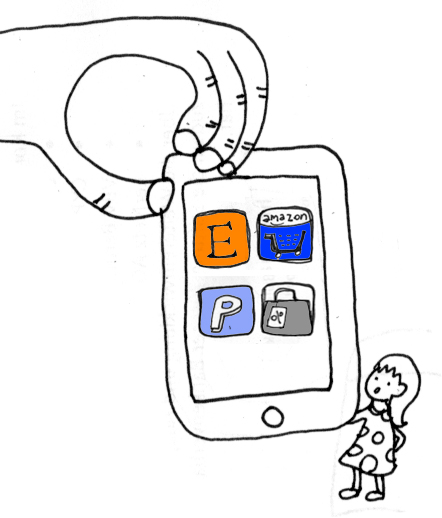How Consumerism Affects Teen Society

This essay is written by Frederic Somm, aged 18 years.
Young people who are developing into grown-ups will face many problems, like wondering, “Who am I?” Some teenagers, as well as some adults, have low self-esteem and are quite insecure. They need something that defines them or gives them personality – they need to find themselves in a way, but how?
This world consists of more than seven billion people. That means we have a lot of people around us, in so-called competition with us. Competition is everywhere, especially in the teenage years. From the way you look, to your education, to the beauty of your partner, your social status or your interests, such as sports or a musical instrument – everything is important. Almost every teen lacks self-confidence at some point and so has even more of a struggle to fit in somewhere. “You are not a beautiful and unique snowflake. You are the same decaying organic matter as everyone else, and we are all part of the same compost pile” (from the novel Fight Club, by Chuck Palahniuk). The truth that you are just one person out of a population of seven billion people and therefore not special, or important, is something many people do not want to see. The majority of the modernized population can not bear to contemplate that they are nobodies; that’s why they have the urge to feel more special by enhancing their beauty, style or bank account in order to find more confidence.
As we know, many people are insecure and a bit lazy. That’s why the media, advertising industry and most of the private firms that sell beauty or lifestyle products may abuse those teenagers by creating the perception that they can feel special by buying specific products. They will basically say, “If you buy our product, you will be popular, good-looking and happy.” In economic terms, this is what is called “manufactured demand.” They will do this by scaring us in our everyday life, seducing us with pictures of a perfect life and then misleading us by telling us what to buy. This is basically what consumerism is all about: creating a niche in the market and then making a profit.
This consumerism has very much affected our ideology of life over the past 200 years. Life for many teenagers has become very superficial. We want all those things that everybody in the media and in advertising are talking about: we want a beautiful partner, open relationship with sex, someone with nice luxury goods, like cars or clothing – basically the whole package. However, “The things you own end up owning you” (Fight Club). So in the end, when you have all your make-up and have seen a slight increase in confidence, you will become dependent and increase your purchasing of the things that you bought to raise your self-esteem. For example, in Zürich approximately 90 percent of all Porsches are leased. That will tell us that most people actually cannot afford a Porsche at its original price, but why, then, do they lease them? They buy such luxury goods to enhance their confidence. A Porsche shows that they are successful in their careers and therefore better than other people. This way of thinking is called external confidence. You can gain confidence by improving your beauty, your bank account or your lifestyle. However, this type of confidence will not last forever, because when you lose one of those external features, you will again feel unloved and under-confident.
Because the majority of teenagers care too much for things like their reputations, they also begin to worry about beauty. Like many girls in this age group, a lot of people have insecurities about their body shapes or their faces. That’s why they need constant reassurance from someone, from friends and partners, that their “negative” quality, such as cellulite or being bald, is not really so unsightly.
However, after time and constant influence from the media and advertising with their perspectives on beauty, consumers are often driven to change those things they see as ugly on themselves by operations or strict diets. For example, every fifth person in South Korea undergoes plastic surgery. They risk this pain, because their view of beauty is very much influenced by lighter-skinned, wider-eyed Asians or even Europeans, and if they go through double eyelid surgery and bleach their skin, they will eventually attain a particular standard of beauty. Through such surgeries women hope to gain more confidence, which is almost never the case due to the fact they don’t accept their problems. Teenagers also do not accept their problems: they want to change them – to seem flawless in their looks and reputation. That’s why teenagers and people generally are victims of the media and society’s pressures. They lack self-confidence and are easily influenced by the media.
The only thing that we actually need to gain confidence and be successful in life is to accept. Accept yourself and your surroundings. This is what we call internal confidence. Do not define yourself by your external features, but rather by your personality and being true to yourself and your beliefs.
You’re not your job. You’re not how much money you have in the bank. You’re not the car you drive. You’re not the contents of your wallet. You’re not your [bleeping] khakis. You’re the all-singing, all-dancing [scum] of the world (Fight Club).
By Frederic Somm
Fred is 18 and in the 11th grade. His hobbies are going to the gym, drawing, filming and photography.




